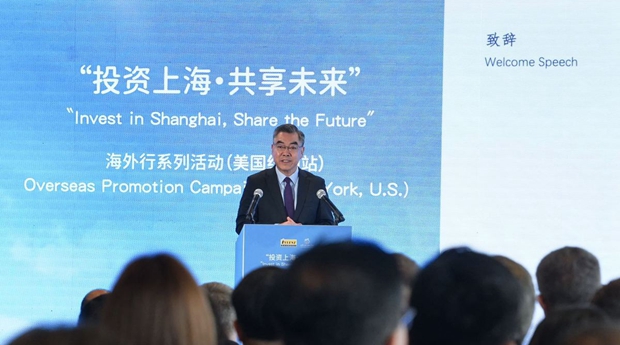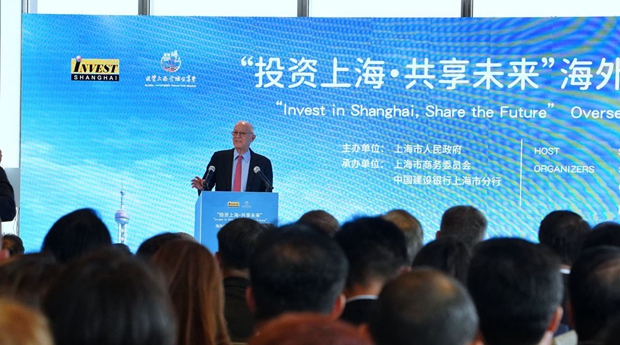Shanghai boosts efforts to attract foreign investment

Chinese Consul General in New York Huang Ping speaks at a Shanghai foreign investment promotion event on May 23 in Manhattan, New York. [Photo by Minlu Zhang/China Daily]
Amid the turbulent China-US relations, Shanghai is determined to attract more foreign investment to the city and maintain sub-national exchanges.
The Shanghai Municipal Government, led by Gong Zheng, mayor of Shanghai, held a promotion event on May 23 in Manhattan at Fosun Plaza. The building, originally owned by JP Morgan, was bought by Fosun International, a Shanghai-based investment company, in 2013.
Chinese Consul General in New York Huang Ping compared Shanghai and New York and said his five years working in New York have revealed the deep connection between the two cities.
As port cities on the eastern coasts of their respective countries, Shanghai and New York are destined to stay open and interconnected. "For them, this is not a choice but a duty," Huang said. "The same is true for China-US relations."
As the world's two largest economies, China and the US together account for a quarter of the world's population and more than a third of its economic output, he said.
"Mutual respect and peaceful coexistence are necessary choices, and win-win cooperation is the optimal solution. Once the door of China-US relations is opened, it will not close again. Attempts to decouple go against the tide of history and reality. The Pacific Ocean is vast enough to accommodate both countries," Huang said.

Stephen Orlins, president of the National Committee on US-China Relations speaks at the promotion event on May 23 in Manhattan, New York. [Photo by Minlu Zhang/China Daily]
The promotion event came amid a new round of tariffs imposed on Chinese goods announced by the US President Joe Biden last week. These include a 100 percent rate on Chinese electrical vehicles, even though only a few EVs are currently shipped from China to the US. Tariffs on semiconductors will be raised to 50 percent, solar cell tariffs to 50 percent, and tariffs on some steel and aluminum products to 25 percent.
China, on the other hand, in March issued an action plan of 24 measures to "steadily promote high-level opening up and make greater efforts to attract and utilize foreign investment". The plan emphasizes that foreign investment is an important force in helping to "achieve Chinese modernization and promoting the common prosperity and development of the Chinese economy and the world economy", according to Xinhua News.
Gong committed to deepening Shanghai's reforms and opening-up, promoting high-quality development and building "a globally influential socialist modern metropolis". Shanghai will focus on accelerating the strengthening of economic, financial, trade, shipping and innovation, he said.
Gong said Shanghai will cultivate new quality productive forces by integrating technology and industry. This involves promoting high-end, green, and intelligent development, as well as focusing on future industries like the digital economy and green energy. The city will advance high-level reform and opening-up. By aligning with international standards and improving the business environment, Shanghai aims to attract global enterprises and ensure Shanghai remains a key hub for international trade and investment. He said the city will also enhance urban governance by improving scientific and intelligent management.
"If you think about a few hundreds years ago, Shanghai was a small fishing village at the mouth of the Yangtze River. Who could have imagined that it would become this mega city with a population of more than 26 million and the GDP larger than many countries? The city is a model of ingenuity and adaptability," said Stephen Orlins, president of the National Committee on US-China Relations.
He urged companies in the US and China to recommit building a US-China relationship that bridges the two great cities and serves the people of both countries.
"We welcome Shanghai's commitment to opening up by leveraging pilot programs within and beyond free trade zones, facilitating policy breakthroughs, and providing a level playing field for US companies," said Craig Allen, the president of the US-China Business Council, who led a group of American companies in Shanghai this March and said they learned of Shanghai's goals to provide better support for foreign companies and to improve the business environment.
"I commend Shanghai's ambitions to build a greater city into a global economy, trade, finance, shipping and innovation. The American companies are well positioned to increase our exports to share the world's best technologies and expertise in a wide range of areas from clean energy to consumer goods," he said.
US foreign direct investment (FDI) in China reached $126.1 billion in 2022, marking a 9 percent increase from 2021, according to data from the Office of the US Trade Representative. The number of jobs in the US supported by exports to China exceeds those supported by exports to the next two-largest Asian markets combined.
China was the United States' third-largest goods export market in 2023, with about $145 billion in US goods and about $42 billion in US services exported to China in 2023, according to the data.
The event was attended by more than 200 representatives from major US-China business associations and companies.

